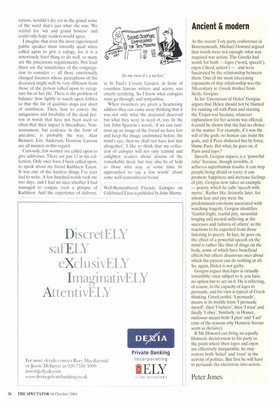Ancient & modern
At the recent Tory party conference in Bournemouth, Michael Howard argued that words were not enough: what was required was action. The Greeks had words for both — logos (word, speech'), mon (deed, action') — and were fascinated by the relationship between them. One of the most interesting exponents of that relationship was the 5th-century BC Greek thinker from Sicily, Gorgias.
In his 'Encomium of Helen' Gorgias argues that Helen should not be blamed for running off with Paris and starting the Trojan war because, whatever explanation for her actions was offered, it could be shown that she had no choice in the matter. For example, if it was the will of the gods, no human can resist the gods, and if Paris abducted her by force, blame Paris. But what, he goes on, if Paris used logos?
Speech, Gorgias argues, is a 'powerful ruler' because, though invisible, it achieves superhuman results: it can stop people being afraid or sorry; it can promote happiness and increase feelings of pity. Gorgias now takes an example — poetry, which he calls 'speech with metre'. Rather like Aristotle later, for whom fear and pity were the predominant emotions associated with watching tragedy, Gorgias identifies 'fearful fright, tearful pity, mournful longing and mental suffering at the successes and failures of others' as the reactions to be expected from those listening to poetry. In fact, he goes on, the effect of a powerful speech on the mind is rather like that of drugs on the body, some of which have beneficial effects but others disastrous ones about which the patient can do nothing at all. So, again, Helen is not guilty.
Gorgias argues that logos is virtually irresistible: once subject to it, you have no option but to act on it. He is referring, of course, to the capacity of logos to persuade, and his view is typical of Greek thinking. Greek peithii, 'I persuade', means in its middle form 'I persuade myself, then 'I believe', then 'I trust' and finally'! obey'. Similarly, in Homer, medontai means both 'I plan' and'! act' (one of the reasons why Homeric heroes seem so decisive).
If Mr Howard can bring an equally Homeric decisiveness to his party to the point where their logos and ergon are effectively inseparable, he may restore both 'belief' and 'trust' in the activity of politics. But first he will have to persuade the electorate into action.
Peter Jones










































































































 Previous page
Previous page